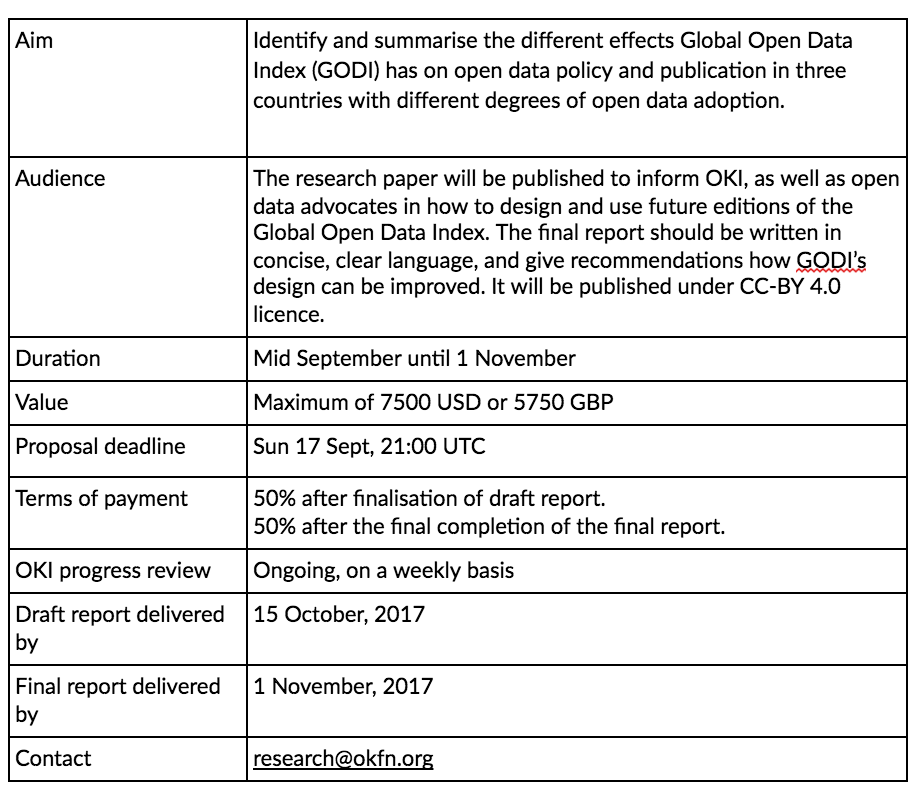Note: The deadline for proposal submission has been extended until Sunday, 17 September, 21:00 UTC.
The Global Open Data Index (GODI) is a worldwide assessment of open data publication in more than 90 countries. It provides evidence how well governments perform in open data publication. This call invites interested researchers and organisations to systematically study the effects of the Global Open Data Index on open data publication and the open data ecosystem. The study will identify different actors engaged around GODI, and how the information provided by GODI helped advance open data policy and publication. It will do so by investigating a sample of three countries with different degrees of open data adoption. The work will be conducted in close collaboration with Open Knowledge International’s (OKI) research department who will provide guidance, review and assistance throughout the project.
We invite interested parties to send their costed proposal to research@okfn.org. In order to be eligible, the proposal must include research background, a short description why they are interested in the topic and how they want to research it (300 words maximum), a track record demonstrating knowledge of the topic, as well as a written research sample around open data or related fields. Finally, the proposal must also specify how much time will be committed to the work and for what cost (in GBP or USD). Due to the nature of the funding supporting this work, we unfortunately cannot accept proposals from US-based people or organisations. Please make sure the submission is made before the proposal deadline of Wed 13 Sept, 21:00 UTC Sunday 17 Sept, 21:00 UTC.
Outline
Background
The Global Open Data Index (GODI) is a worldwide assessment of open data publication in more than 90 countries. It provides evidence how well governments perform in open data publication. This includes mapping accessibility and access controls, findability of data, key data characteristics, as well as open licensing and machine-readability.
At the same time GODI provides a venue for open data advocates and civil servants to discuss the production of open data. Evidence shows that governance indicators drive change if they embrace dialogue and mutual ownership of those who are assessed, and those who assess. This year we wanted to use the launch of GODI to spark dialogue and provide a venue for the ensuing discussions.
Through this dialogue, governments learn about key datasets and data quality issues, while also receiving targeted feedback to help them improve. Furthermore, every year many interactions happen outside of the GODI process, not including the GODI staff or public discussions. Instead results are discussed within public institutions, or among civic actors and public institutions. Some scarce evidence of GODI’s outcomes is available, yet a systematic understanding of the diverse types of effects is missing to date.
Scope of research
This research is intended to get a systematic understanding of the effects of the Global Open Data Index on open data publication and the open data ecosystem. It addresses three research questions:
- In what ways does the Global Open Data Index process mobilize support for open data in countries with different degrees of open data policy and publication? How does this support manifest itself?
- How does the Global Open Data Index influence open data publication in governments both in terms of quantity and quality of data?
- How do different elements of the Global Open Data Index help governments and civil society actors to drive progress around question 1 and 2?
GODI’s effects can tentatively be grouped into high-level policy and strategy development as well as strategy implementation and ongoing publication. This research will assess how different actors such as civil servants, high-level government officials, open data advocates and communities engage with different elements of GODI and how this helps advancing open data policy and publication. The research should also, whenever applicable, provide a critical account of GODI’s adverse effects. This can include ‘ceiling effects’, tunnel vision and reactivity, or other effects. The research will assess these effects in three countries. These may include Argentina, Colombia, Ukraine, South Africa, Thailand, or others. It is possible to propose alternative countries, if the researcher has strong experience in those or if it would help gathering data for the research. Proposals should specify which three countries would be assessed. If alternative countries are proposed, they should meet the following criteria:
- One country without national open data policy, one country with a recent open data policy (in effect between 3 months and 2 years), as well as countries with established open data policies older than 2 years)
- A mix of countries with different endorsement for GODI, including countries who actively announced to increase their ranking (high importance) and countries where no public claims for open data improvement are documented
- Presence of country in past two GODI editions
- May include members of the Open Government Partnership and Open Data Charter adopters, as well as non-members.
Deliverables
The work will provide a written report between 5000 and 7000 words length addressing each of the research questions. The report must include a clearly written methodology section and country sampling approach. The desired format is a narrative report in English. A qualitative, critical assessment of GODI’s effects on open data policy and publication is expected. It needs to describe the actors using GODI, how they interacted with different aspects of GODI, and how this helped to drive change around the first two research questions outlined above. Furthermore following deliverables are expected:
- Interviews with least four interviewees per country
- A semi-structured interview guide
- Draft report by 15 October, structured around country portraits for three sample countries.
- Weekly catch-ups with the Research team at OKI
- Final report by 1 November
Methods and data sources
The researcher can draw from several sources to start this research, including OKI’s country contacts, Global Open Data Index scores, etc. Suggested methodology approaches include interviews with government officials and GODI contributors, as well as document analysis. Alternative research approaches and data sources shall be discussed with OKI’s research team. The research team will provide assistance in sampling interviewees in the initial phase of the research.
Activities
It is expected that this work is conducted in close contact with OKI’s research department. We will arrange a kick-off meeting to discuss your approach and have weekly calls to discuss activity and progress on the work. Early drafts will be shared with the OKI team to provide comments and discuss them with you. In addition we will have a final reflection call. Remote availability is expected (via email, Skype, Slack, or other channels). Overall research outline and goals will be discussed and agreed upon with the research lead of GODI who will help in sampling countries and will review project progress.
Decision criteria
We will base our decision of selecting a research party on following criteria:
- Evidence of an understanding of open data assessments and indicators, and their influence on policy development and implementation.
- Track record in the field of open data assessment and measurement.
- Clarity and feasibility of methodology you propose to follow.
Due to the nature of the funding supporting this work, we unfortunately cannot accept proposals from US-based people or organisations. Please make sure the submission is made before the proposal deadline of Wed 13 Sept, 21:00 UTC Sunday 17 Sept, 21:00 UTC.
The official voice of the Open Knowledge Foundation.











I would like to be involved as a researcher to systematically study the effects of the Global Open Data Index on open data publication and the open data ecosystem. The study will identify different actors engaged around GODI, and how the information provided by GODI helped advance open data policy and publication. It will do so by investigating a sample of three countries with different degrees of open data adoption. You have mentioned that the work will be conducted in close collaboration with Open Knowledge International’s (OKI) research department who will provide guidance, review and assistance throughout the project.